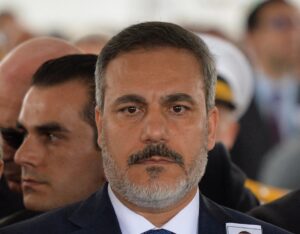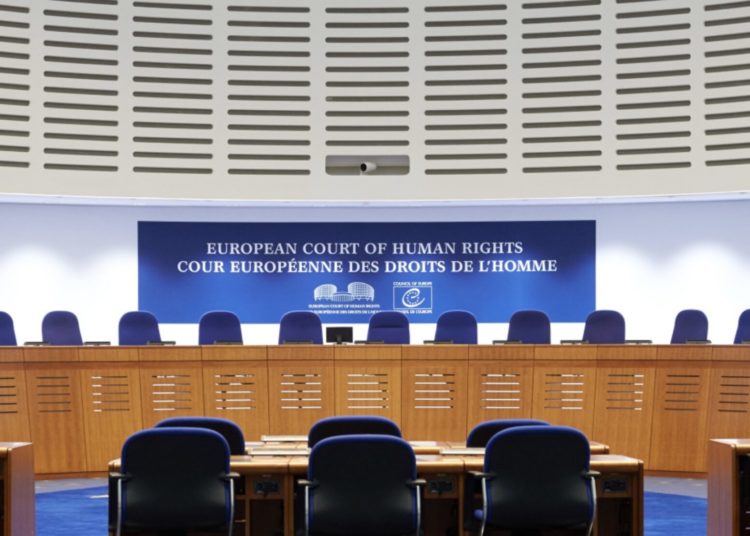Levent Kenez/Stockholm
During budget discussions held in the Turkish parliament on Monday, the foreign minister stated in response to questions that Turkey does not implement European Court of Human Rights (ECtHR) decisions for political reasons. The court decisions mentioned by the minister include those related to Kurdish politician Selahattin Demirtaş and businessman Osman Kavala.
Foreign Minister Hakan Fidan claimed that Turkey ranks among the countries with the highest percentage of ECtHR decisions implemented among member states. He said certain cases have become symbolic and politicized and that the difficulties are related to these specific cases.
Fidan stated that European counterparts have been informed that if they approach these cases politically, the response they receive will also be political. He cited this as the reason when explaining the non-implementation of ECtHR decisions.
Fidan also claimed that political pressure is exerted on Turkey through newspaper headlines in Europe, meetings attended by members of parliament and panel discussions.
On Wednesday Justice Minister Yılmaz Tunç, who participated in the budget discussions for his ministry, faced criticism for the fact that Turkey does not implement ECtHR decisions. Previously, in October, Tunç had criticized the top human rights court in its ruling of a violation of rights in a teacher’s case, claiming that the court does not serve as an appellate court over the Turkish judiciary.

In a landmark decision with potentially far-reaching implications, the ECtHR ruled on September 26 that the conviction of Yüksel Yalçınkaya, a teacher in Turkey, on terrorism charges, which included using a mobile phone app and having an account at a specific bank, was unlawful. The decision could have significant consequences for thousands of individuals facing similar charges in Turkey.
The minister declined to respond to questions related to the ECtHR during the session.
Opposition lawmaker Ümit Özlale drew attention to the absurdity of the situation by highlighting the absence of any financial data or information regarding activities conducted at the ECtHR by the ministry in its 2024 budget.
The CoE’s Committee of Ministers considered further action during its June 5-7 meeting in the event Turkish authorities did not release Kavala, who has been in prison since October 18, 2017 despite a 2019 ECtHR ruling that deemed his detention in pursuance of an “ulterior motive,” that of silencing him as a human rights defender.
Meanwhile, the Parliamentary Assembly of the Council of Europe (PACE) held an urgent debate in Strasbourg on October 13 during which they called on Turkey to adhere to the binding judgments of the ECtHR and to release Kavala. They underscored that this case undermines “the credibility of the organisation.”
In a resolution based on a report by Austrian deputy Petra Bayr, PACE expressed its disappointment with Turkey for failing to release Kavala despite a clear judgment from the ECtHR in 2019 that called for his immediate release.
Furthermore, PACE highlighted that Kavala’s aggravated life sentence was upheld in September 2023. The Strasbourg court had previously determined that there was no credible evidence to support the charges against him and that his detention was aimed at silencing him, categorizing him as a “political prisoner.”
In light of this, PACE believes it’s time to urge member states to pass “Magnitsky legislation” or other legal measures to sanction Turkish officials responsible for Kavala’s illegal detention if his release doesn’t take place.
Additionally PACE mentioned its ability to challenge the credentials of the Turkish delegation in its 2024 session if Kavala is not released by January 1, 2024.
On September 22 the Committee of Ministers of the Council of Europe declared that the ECtHR had found violations regarding the fair trial of Kurdish politician Selahattin Demirtaş, calling for his release.
Demirtaş was arrested on November 4, 2016 on charges of forming an organization with the intent to commit a crime and membership in a terrorist organization.
On May 28, following his re-election, Turkish President Recep Tayyip Erdogan delivered a victory speech, saying Demirtaş would never be released as long as he was in office, while his supporters chanted “Death penalty for Demirtaş.”

The Erdogan government has frequently been accused of labeling its critics as terrorists and using the judiciary it controls to imprison them. Turkey is by far the leader in the number of prisoners convicted of terrorism in Europe, according to the 2021 Council of Europe Annual Penal Statistics on Prison Populations report, better known as SPACE I.
According to a previous analysis by Nordic Monitor based on SPACE I data, 32,006 people convicted of a terrorism-related crime are currently behind bars in Europe. A total of 30,555 of these people, or 95 percent, are in Turkish prisons. In other words, Turkey hosts almost all prisoners convicted of terrorism in Europe. Turkey is followed by the Russian Federation with 1,026 prisoners, or 3.2 percent of the total number of terror prisoners. Spain is in third place with 195 inmates.
Following a controversial coup attempt on July 15, 2016, a witch hunt launched by the government of President Erdogan that labeled opponents as terrorists yielded the result that a record number of Turkish citizens were investigated and convicted of terrorism.
According to official statistics, terrorism investigations were launched into 2 million people between 2015 and 2020. Given the fact that 59 million Turkish citizens are over the age of 18, one in every 30 people has faced trumped-up terrorism charges.
According to the updated information provided by Justice Minister Tunç during Wednesday’s budget meeting, legal proceedings have been initiated against 696,526 of these 2 million, of which 123,000 have been convicted and received various sentences.
Members of the Gülen movement, a group that is critical of the government, constitute the overwhelming majority of those who were prosecuted and convicted.












